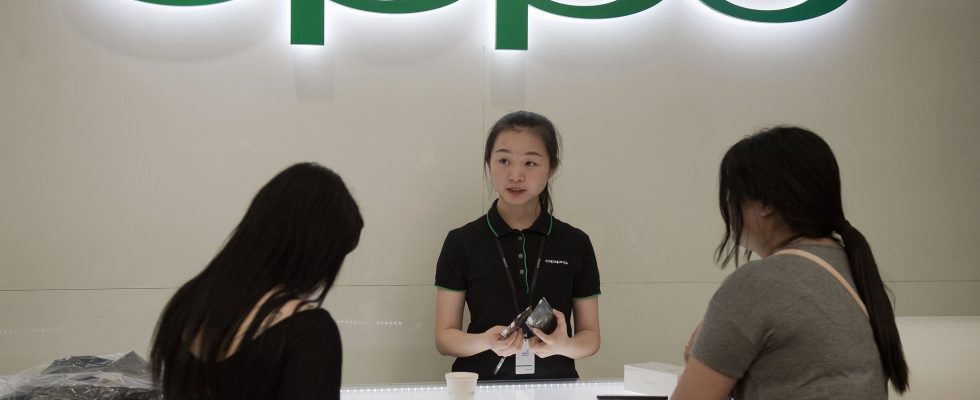The rumor swelled for months. The smartphone manufacturer Oppo has finally formalized its departure from the French market on the sly, on July 24. The Chinese, world number 4 in the sector, present since 2018 in the territory, leaves several dozen employees on the floor. Devices will always be updated. Certain models should also persist in France, thanks to the efforts of a handful of retailers. But with relative indifference on the part of the company. It also seems unthinkable for Oppo to continue its sponsorship activities with the Roland-Garros tournament, as in the last two editions.
At first glance, the decision may surprise. Oppo is not dying. The brand, owned by BBK Electronics Corporation, which also includes the Realme and OnePlus brands, became the leading smartphone manufacturer in China in the first half of 2023, capturing 18% of this huge market. But if Oppo shines on its lands of origin, Europe remains a more hostile territory. The Swedish telecom giant, Nokia, has thus criticized the firm for the use of its patents on 5G. The trial, lost across the Rhine, caused a first departure from Germany a year ago, with OnePlus in its suitcases. Despite winning in France in similar proceedings, Oppo still set sail.
Because the problem goes beyond that. It does not only concern Oppo, but also Vivo or Xiaomi, two other Chinese brands. In 2022, “the smartphone market has fallen by almost 20%” on a global scale, laments Guillaume Chaigneau, of Xiaomi, the third manufacturer in France. Although the decline continues at a slower pace at the moment, the shock has not been absorbed in the same way by everyone. In the match between the titans Samsung and Apple, the Chinese manufacturers, positioned in the mid-range, or even the entry-level, were the most exposed.
When the United States gets involved
“The consumer has changed: he buys less regularly, the renewal cycles of the device are longer. On the other hand, he is ready to pay a little more for his smartphone”, observes Guillaume Chaigneau. Result: the most “premium” telephones, sometimes offered beyond 1,000 euros, are those that succeed best in countries where purchasing power is the highest. According to the office Counterpoint, the five most sold mobiles in France, in the spring, were the iPhone 14 and the Samsung S23, with their variations (Max, Pro, Plus). A similar dynamic can be observed in several Western countries.
Oppo, which claimed 6% market share in France only 24 months ago, had recently fallen to 2%. Vivo, another Chinese challenger present in France since the fall of 2020, is also living under a procedure with Nokia in Germany. Its sales there are currently suspended. Globally, these fell by 17% in one year. A scenario à la Oppo is not excluded if the trend increases. The company no longer releases some of its most innovative devices on the Old Continent, like its latest folding models. Contacted by L’Express, Vivo did not respond.
Xiaomi is the player that is doing the best, with 9 million users in France, and a “critical size” allowing it to absorb the backlash of sales declines, according to its director France. However, some clues do not lie. The brand evokes a “loyalty” phase, rather than the acquisition of new customers. Xiaomi no longer has an official store on French soil, the one located on the Champs-Elysées, the most prestigious, being the last to close. The manufacturer finally owes its status as the only real challenger to Samsung and Apple to the sudden withdrawal of Huawei. Deprived of Google’s Android operating system and latest generation chips due to a salvo of American sanctions, the Shenzhen firm has seen its sales decline.
Just before the Covid-19 crisis, at its peak, Huawei symbolized the spectacular rise of Chinese mobile phones, which are reliable, innovative and above all inexpensive. Bringing in its wake a host of compatriots. “In addition to fierce competition, the tension around semiconductors imposed by the United States is, in my opinion, the real explanation for the decline of Chinese manufacturers”, analyzes Jean de Chambure, consultant in digital strategies at JDC Advisory. Which, contrary to the macroeconomic context, is set to last for many more years. Oppo, Xiaomi, Vivo, Realme, OnePlus or Honor live with this Damocles sword above their heads. At South China Morning Postthe spokesperson for a Chinese company hit by US sanctions sums up, on condition of anonymity, the challenge: “innovation or death”.
